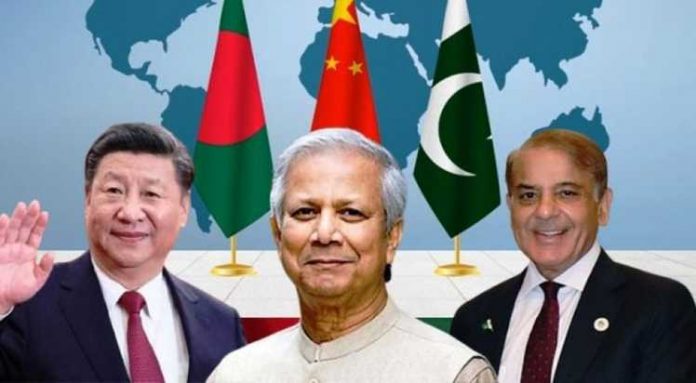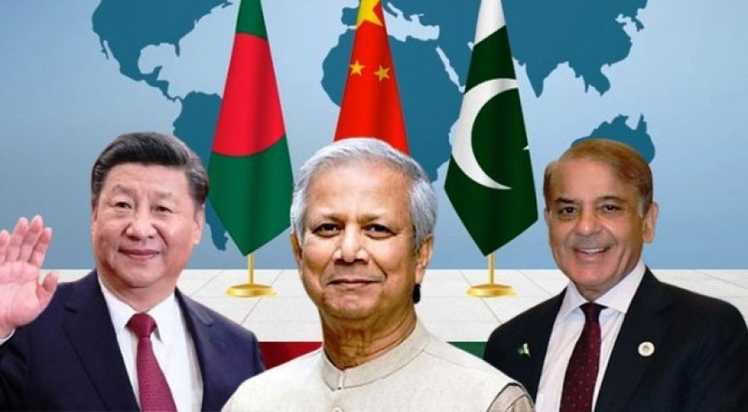
Asad Mirza
Recently, China and Pakistan have discussed between China, Pakistan and Bangladesh about preparing a new regional platform in South Asia as an alternative to SAARC. However, China has not confirmed this, although Pakistan’s Express Tribune newspaper reports that negotiations are going on between Islamabad and Beijing on the formation of a new platform to promote regional integration and relationship. India, which has always been active in challenging its important role in promoting multilaterals in the region in the South Asian region, cannot ignore the project presented by its two rival countries.
China and Pakistan Strategic Strategy in South Asia: According to a report by The Express Tribune, a map of the stage has been prepared at a meeting in Kunmang, China’s capital Kunmang on June 19, 2025. Chinese Deputy Country Minister Sun Wadeong also attended the meeting and was also presented to top officials of Pakistan and Bangladesh.
No formal joint statement was issued after the end of this tripartite meeting. In fact, the three countries issued separate statements with Bangladesh under the interim government and declared it an informal meeting. Pakistan described it as a tripartite system and the opening meeting of Beijing, described it as a meeting of Tripartial Deputy Foreign Minister/ Foreign Secretary level. However, he did not mention in his statement that the three have intended to create a platform which is an alternative to SAARC. But Pakistani media has reported that talks are going on on the formation of a new platform in South Asia through Islamabad and Beijing, so it is difficult to reject the possibility of their secret strategic measures in the region.
The real objective of creating SAARC replacement: Obviously the main objective of Pakistan and China can reduce the impact of New Delhi in the region by offering an alternative to SAARC, where India is an important player. With its $ 4 trillion economy, India has played an important role in the development of Sri Lanka, Bhutan, Bangladesh, Nepal and Maldives.
Until last year, before the return of Sheikh Hasina government in Bangladesh, India had given four -fold to Bangladesh, which included a 500 million loan to defend it. India provided a loan of about $ 8 billion to Bangladesh to Bangladesh for the development of infrastructure such as roads, railways, shopping and ports.
Observers say that Mohammad UNUS, Chief Advisor to the interim government of Bangladesh, has given priority to the geographical political interests of Dhaka about previous complaints, by selecting Pakistan’s historical non -bangla politics on a large scale, and hence a possible new platform is considered.
Apart from all this, Bangladesh has requested China to provide a $ 5 billion loan to help import bills to fill the country’s foreign exchange reserves and budget. Already Bangladesh has borrowed a total of $ 7.5 billion from China with the fourth largest lender of Beijing Dhaka.
Against this background, it is difficult to reject the possibility of China’s growing presence in Bangladesh, which can affect the geographical political balance of South Asia and increase security concerns for India. Especially all over Asia, except India and Bhutan, almost every country is involved in China’s Belt and Road Initiative (BRI) and suffers from Beijing’s debt.
This growing economic support has enabled China to pursue its geographical political interests in the region. Through recent developments in Sri Lanka and Maldives, Beijing has pressurized the two countries to allow Chinese spy ships and submarine docks to increase serious security risk for India and its allies.
Will the new platform be effective?: There is no guarantee that the plan to change SAARC through China and Pakistan will be successful. There are many reasons for this: First, many countries in the region are cautious about the increasing domination of China and the political instability of Pakistan. Second, countries like Sri Lanka and Pakistan are facing economic problems due to unstable Chinese loans. Third, India is the largest economy and is one of the major strategic players in South Asia, and so, any platform that tries to oppose India or tries to reduce its impact is unlikely to achieve any success in the region. The fourth, South Asian countries are diverse and conflict. It can be ineffective and ineffective to bring them together through China, Pakistan -based platforms. Fifth, unlike India, which shares historical, cultural and linguistic relations with Nepal, Bhutan, Sri Lanka, Bangladesh, Maldives and even Pakistan, China shares its emotional and cultural relations in South Asia. Sixth, many countries in the region can think twice before joining China, Pakistan -new platforms, because their move can be considered anti -India rather than really promoting regional development.
China, Pakistan’s planned step, to make SAARC a complete, reflects a major commitment to renew the strategic and diplomatic needs of South Asia, its success is uncertain. The geographical political scenario of the region is very complex, which cannot be fully performed by other countries through a completely economic greed or anti -deficit spirit.
Any attempt to return India through these parallel countries will not only face natural resistance, but will also risk the already important alliance of the region.
Instead of promoting real regional cooperation, China, Pakistan runs like a geographical political exercise to prevent India’s influence. But until it provides transparent, comprehensive and mutual beneficial results, its success cannot be ensured and it is unlikely that South Asian countries support such a new development.
In this context, India should be cautious to strengthen its traditional partnership during the creation of faith, mutual respect and shared prosperity, diplomatically and actively active. However, the actual examination of South Asia is not in choosing aspects, but in choosing a permanent and sovereign future.
(Essay is a senior political analyst, in the past he was also associated with BBC Urdu Service and Gulf Timezbai.
[email protected]
Click here to join us on social media. Click 👉 https://bit.ly/folkrrs


